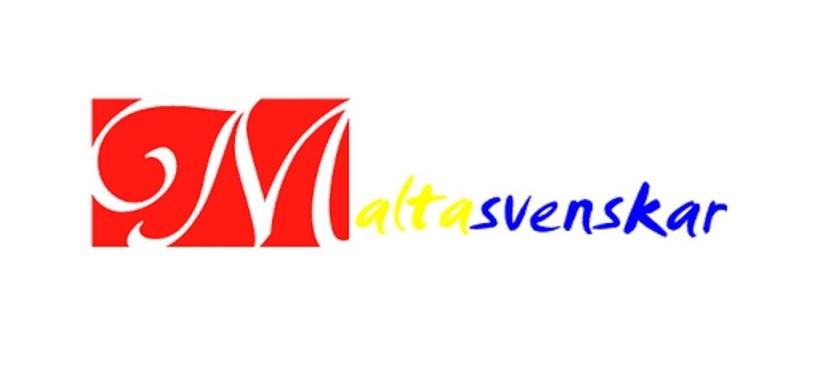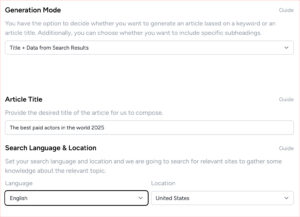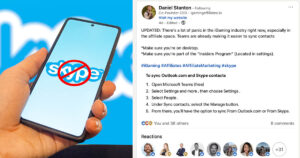One way of reaching your target group is to create a facebook group addressing the needs of those individuals. This is the “to get value you have to provide value” approach of communication. This is an approach that some people avoid because the up front investment in time and energy is huge. You have to put in huge effort before you see any return on investment. That, however, did not stop Robin Axelsson from using this method to reach Swedish speaking individuals in his home country in Malta. He started the Facebook group “Maltasvenskar” (roughly translated into “Maltese Swedes”). We met up with Robin in order to learn more about his work.
What made you decide to start the group?
It all started when I joined a company in Malta as General Manager. The company had a problem finding Scandinavian-speaking staff, mainly Swedish speakers. We spent a lot of money on recruitment agencies and still the applications weren’t enough. I realised that this was a common problem in Malta – companies looking for Swedish-speaking employees.
So how can I put Malta on the map in Sweden as an attractive country to live and work in? I need to create a community and also sell the island. I started researching other Facebook groups (Swedes in Oslo, Swedes in Thailand, Swedes in Barcelona) and even online forums. They all had major problems; there were too many trolls, negativity and too many spams of all sorts of products and services, leading to less interaction within the group.
When someone asked a question, they would get many unrelated or very negative responses. A common theme online is that if you have one bad experience about a person or a company, the first thing you do is to put it online. However, this does not often reflect the whole picture. People won’t come up with helpful answers, and others stopped asking questions.
So I made a decision – no negativity and no bad comments of people or companies, no matter what. We are very strict about this. But it works. 🙂
How long has the group been active?
Since September 2012
Did you have to do any advertising to get the group going?
No paid advertisement; it is all organic. Last time I created a website was over 20 years ago in my teen room in the ’90s, but I realised that I had to create a website to drive traffic. It was a very bad looking Maltasvenskar.se, which targeted specific keywords for SEO purposes. It ranked first place on Google, and I was able to drive traffic to the group from that.
I know you are not alone. How many people are actively working with the group?
We are two. In the beginning, I was doing everything myself. Notifications and PMs were getting out of hand. It went so far that even my boss started complaining.
I wrote to a very active member of the group named Anna Colley and asked if she wanted to help out. This was a game changer and I can’t emphasise enough how important she has been. She’s the queen of Maltasvenskar, and without her, this wouldn’t have worked.
Thank you, Anna. You rock!
Which tools do you use to manage the group?
We get notifications for everything that happens in the group, but a lot comes from the members. They report posts and also write to us if there is something they see that doesn’t follow the rules.
What are the biggest lessons learned?
Even though the initial idea was to help me recruit, the most important thing is to focus on creating value. If this group had been about the company I worked for or even myself, then it wouldn’t have created the great community of people helping each other.
Don’t be afraid to ask for help. You don’t have to do everything by yourself.
Never stop changing and adapting. Don’t get stuck in “This is how it has been and should be”.
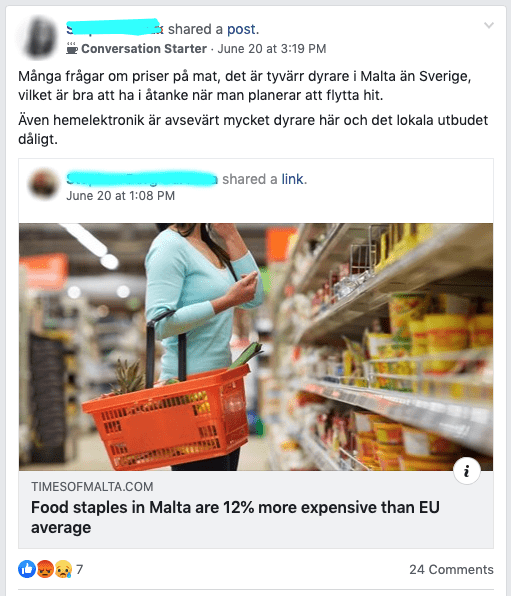
A common thread is to discuss news articles that compares living in Malta to living at other places.
In Maltasvenskar, you have to be approved to be allowed in. Why have you chosen that way?
Yes, we are very strict about this. We want to have a group where all content is in Swedish (in Danish and Norwegian, too) and keep spammers out of it. If you’re not in the group to contribute or just for your own purpose, then you have nothing to do there.
If I want to start a similar group, for a different niche, what steps should you take?
Think long term and think value. How do I get people engaged and how can this create value for the members?
What are the best things about running a group like this?
The interaction of the people and also the thank you emails, comments and pm’s you get for helping people. Even if you get negative comments, a small “Thank you” will change everything.
What 5 mistakes did you make that can be avoided easily?
When you first popped the question I had to really think about it. Five mistakes… I can’t come up with that. And that’s probably the first one, assuming you won’t make mistakes.
Next is not setting rules from the beginning. Sure it was back in 2012, but still, some general rules could have been written down after some simple research of other groups. Now, the rules had to change as we went along and that made some members unhappy.
Third mistake: Don’t underestimate your trolls. They can be frustrating. But take a legend like KJ back then [editors note: a very active member]. He was always commenting on everything, and even though many members didn’t like it, many checked the group just to see what would happen after his comments. Trolls and originals like that can build a group quickly. You just have to know how to contain them a bit.
Net mistake: Thinking you can do everything yourself. I should have asked for help much sooner.
Last mistake: Thinking too small. For example, the name Maltasvenskar which means Malta Swedes. The name is super niche, but it doesn’t have space to grow. Well, today the group is popular with Danes, Finns and Norwegians as well.
Can you give examples in what way Facebook groups can give value?
The most successful groups on Facebook that I know of are the ones whose members help each other. If you create a group only for yourself to post, then it will quickly die out.
It’s as simple as: I have a problem. I can either Google it or ask someone who knows. You have a member who knows the answer and is happy to help the other members. If you can create the above, then you’re on to something good.
Side note: At the start, you have to always be number 2 yourself.
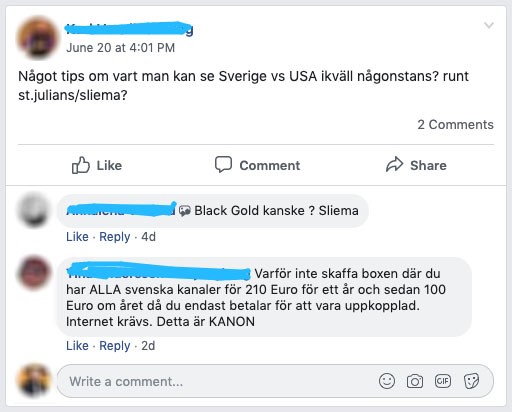
A typical interaction, somebody asks a question and friendly Swedes in the group answer.
Facebook today is not what it was 10 years ago. What changes have made it harder or easier for your group?
To be honest, I’m pretty surprised by the age difference that we have in the group. Everyone knows that the younger generation doesn’t really use Facebook so much anymore. It’s either that they are on Snapchat, Instagram or something else that I don’t know the name of because I’m over 30 years old.
Another thing that has changed is the advertising, bots and spam. 10 years ago that was different. Now FB is a world almost out of control.
If you’re starting a group today, it will be much harder because you have to get through all the noise and compete with other platforms. When I began Maltasvenskar, it was just a fun thing on Facebook (which everyone used as main social media)
Have the activity levels changed these last 10 years?
Yes, a lot. Just by talking to my younger sister, I understand that Facebook is not used as it used to be. Everyone used to post things on Facebook all the time. It was often about I ate this and then I ate that and then my cat did this. But people posted all the time back then.
Today, you don’t post things on Facebook if you’re under 25; you just scroll it. It’s only us Facebook veterans and governments that seem to create content these days.
Finally, if you would give the top five ways of getting many users to your group, what would that be?
- Start with a core group that you know and that will be able to help you.
- The group has to be a niche.
- Write in other groups.
- Connect the group with a website.
- Post, post and post.


